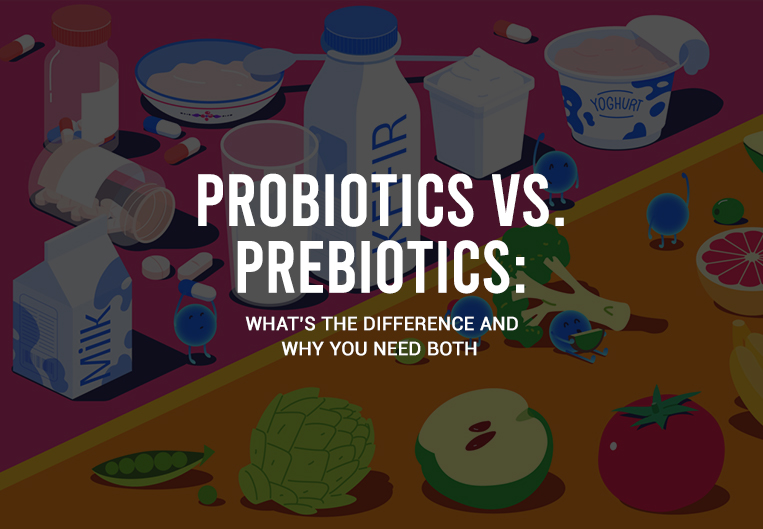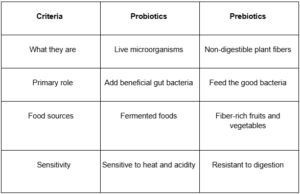Probiotics vs. Prebiotics: What’s the Difference and Why You Need Both


Hello, in an AI-driven world, things are easy to do, and while we are performing countless tasks just by simply sitting, our lifestyles after COVID-19 have changed. In our changed lifestyle, we give importance to our gut health more than ever. Our body has micro-organisms that aid digestion and help keep the gut healthy.
Before we start, let us share our overview. We, at Ultreze Enzymes, are leading quality Probiotics manufacturers, formulators and suppliers globally. We manufacture and supply the best quality enzymes and probiotics at the best price which is why we are the leading enzyme manufacturer and supplier in India.
Let’s explore in more detail why Probiotics and Prebiotics are both important and what their roles are for gut health. This blog will delve through the details of what probiotics & prebiotics are, the key differences between them and much more.
When it comes to digestion, you may have heard a lot about prebiotics and probiotics. They do sound similar, but they have very distinct jobs in your digestive tract. So, what is the actual difference between prebiotic and probiotic? And why do you need both prebiotics and probiotics to have a healthy gut? Let’s break it down in a simple, easy-to-talk-about way.
Table of Contents
ToggleWhy Gut Health Matters
In your digestive system there would be trillions of bacteria good and bad. The microbials will also affect your digestion, your immune function, and even your mental health. This is why supporting your gut microbiome might be the best thing you do for your overall health. But why do you need both probiotics and prebiotics? Because they’re the dynamic duo that keeps your gut in balance, contented, and working at its optimum level.
Probiotics are alive bacteria
Prebiotics are non-digestible fiber found in some of our plant foods. Prebiotics, “pre-bacteria” are not bacteria like probiotics, they are a food source for your good bacteria gut. Prebiotics like inulin and Fructooligosaccharides (FOS) convey food components to good bacteria or probiotics in your gut to provide healthy gut flora. Prebiotics can be likened to the fertilizer that helps the garden that is your internal gut grow. This is why prebiotics for gut health are just as important as probiotics.
Improve digestion
- Boost the immune system
- Help restore microbial balance
If you’re searching for the top probiotics and prebiotics for gut health, you want to ensure that you opt for varied strains with scientific evidence.
What Are Prebiotics?
Prebiotics are undigested fiber present in particular foods of plant origin. They are the bacteria themselves! Prebiotics stimulate beneficial gut flora merely by providing them with a source of energy, and they can just grow and multiply. Consider your gut as a garden probiotic are the seeds, and prebiotics such as inulin and FOS are the superfood fertilizer that feeds them into growth.
While probiotics are center stage, prebiotics for digestive health are just as important, they’re the behind-the-scenes heroes powering your friendly flora and maintaining your digestive groove in tip-top shape.
Prebiotics vs. Probiotics: Who does what in your gut symphony?
Let’s put them head-to-head in a fun little gut-health face-off:

When it comes to comparing prebiotic and probiotic, or asking what the difference is between prebiotic and probiotic, this table sums it up:
One introduces good bacteria, the other keeps them alive and healthy. Fermented foods and gut health go together. Most of the foods rich in probiotics are fermented foods, meaning that they contain live cultures to support your digestive system naturally.
Top fermented foods with probiotics:
- Yogurt, Kefir, Kimchi, Sauerkraut, Miso, Kombucha, and Tempeh
- Consuming these will aid your microbiome and gut health in becoming healthier.
Probiotics and Prebiotics in Harmony
This is where the synergy exists: The mechanism by which
and prebiotics prefer to work harmoniously is like tilling the soil for a garden. Probiotics are the seeds (healthy bacteria), and prebiotics are the fertilizer (fiber), nutrients that cause the seeds to grow.
Together, they:
- Enhance nutrient absorption
- Strengthen the immune system
- Maintain gut lining integrity
The advantages of consuming probiotics and prebiotics simultaneously are much higher than consuming either one separately. It’s all about balance.
Read also: Probiotics Benefits on Human Health: Complete Guide
Best Foods Containing Probiotics and Prebiotics
To enhance your gut naturally, eat foods that are rich in both prebiotics and probiotics.
Best food sources of probiotics:
Yogurt, Kefir, Kimchi, Miso, Tempeh, Kombucha, Garlic, Onions, Leeks, Asparagus, Bananas, Oats, Apples, and Chicory root.
For the best results, include a mix of these daily. That’s your go-to plan for the best prebiotic and probiotic routine.
Probiotics and Prebiotics for Daily Use
But how do you apply this to daily life?
- Start your morning with a banana or oats (prebiotics)
- Add kimchi or yogurt to lunch or dinner (probiotics)
- Snack on apples or drink kombucha
The daily regimen of probiotics and prebiotics guarantees that your gut remains supported at all times, not only when you feel off.
Read also: How to Choose the Best Probiotic For Optimal Health
Probiotic and Prebiotic Supplements Demystified
There are times when food cannot cut it. That’s when probiotics and prebiotics supplements save the day. They’re perfect when your diet is not very varied or when your health requires a bit of a boost.
What to search for in a supplement:
A combination of multiple probiotic strains, Prebiotic fiber like inulin or FOS, High CFU load, Trust-worthy, clear manufacturers.
Selecting the quality probiotics and prebiotics for your digestive health is a concern for quality and science backing in the first instance. Please get a doctor’s advice before attempting a new supplement.
Popular FAQs and Myths
1 Can you mix probiotics and prebiotics?
Indeed! They actually perform better that way.
2 Are there side effects?
Usually mild, like gas or bloating when starting. They often resolve as your body adjusts.
3 Do you need both every day?
Ideally, yes. Regular intake helps maintain a healthy gut environment.
4 Are they safe for kids and the elderly?
Generally, yes. But it’s best to consult a doctor, especially for supplements.
Conclusion
It’s not a contest between prebiotics vs probiotics, it’s a team effort. Each is used for its own distinct purposes to assist in healthy gut bacteria, digestion, and well-being. Learning about the distinction between prebiotic and probiotic will assist you in making healthier decisions for yourself. If you’re getting them from foods or supplements, it’s quite easy: build your balanced gut and feel good each day. Then, join forces with probiotics and prebiotics and give your gut the daily care that it needs!

